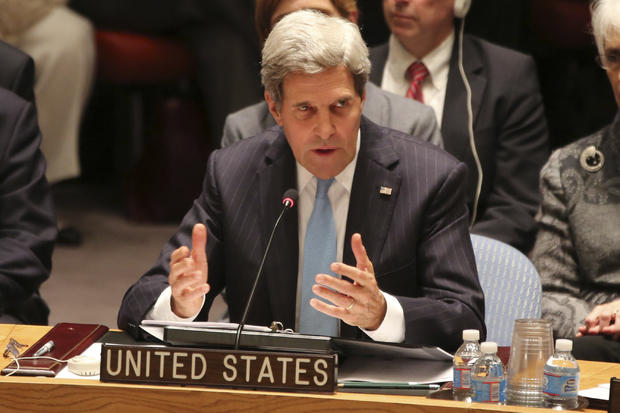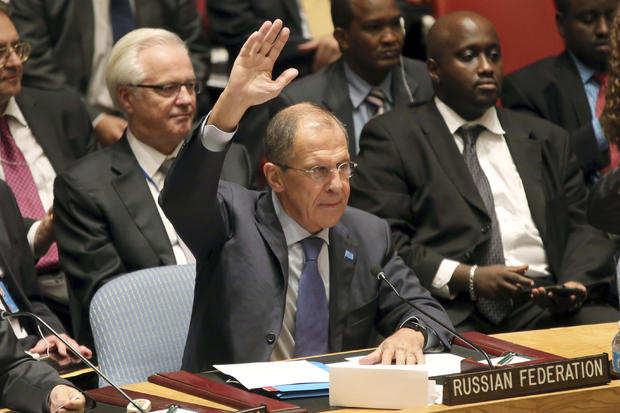U.N. votes to eliminate Syria's chemical weapons
Updated 10:57 PM ET
UNITED NATIONS The U.N. Security Council voted unanimously Friday night to secure and destroy Syria's chemical weapons stockpile, a landmark decision aimed at taking poison gas off the battlefield in the escalating 2-and-a-half-year conflict.
The vote after two weeks of intense negotiations marked a major breakthrough in the paralysis that has gripped the council since the Syrian uprising began. Russia and China previously vetoed three Western-backed resolutions pressuring President Bashar Assad's regime to end the violence.
"Today's historic resolution is the first hopeful news on Syria in a long time," U.N. Secretary-General Ban Ki-moon told the council immediately after the vote.
U.S. Secretary of State John Kerry said the "strong, enforceable, precedent-setting" resolution shows that diplomacy can be so powerful "that it can peacefully defuse the worst weapons of war." Kerry said the destruction of Syria's chemical weapons stockpile will begin in November and be completed by the middle of next year.
As a sign of the broad support for the resolution, all 15 council members signed on as co-sponsors.
For the first time, the council endorsed the roadmap for a political transition in Syria adopted by key nations in June 2012 and called for an international conference to be convened "as soon as possible" to implement it.
"The U.N. Security Council's vote to adopt an impasse-breaking, binding resolutionto secure and eliminate Syria's chemical weapons stockpiles has much broader implications than meets the eye," said CBS News' Pamela Falk, from the U.N. on Friday evening, "because it represents a U.S.-Russia "reset" in terms of dealing with the deadlock at the Council on Syria, and it mandates the creation of long-overdue international peace talks on transition in Syria."
"The high-level interest in the vote on the resolution was illustrated at the U.N. by the unusual participation in many of the permanent members' minister-level participants, including U.S. Secretary of State John Kerry, his Russian counterpart, Russian Foreign Minister Sergey Lavrov, and the U.N. Secretary General, Ban Ki-moon," Falk reported.
Ban said the target date for a new peace conference in Geneva is mid-November.
"Earlier in the day," said Falk, "the opposition Syrian National Council President, Ahmad al-Jarba, told reporters in New York that he would participate in a "Geneva II" conference, as long as it had in its view, a transitional government with full executive powers, which is a goal stated in the resolution adopted by the Council," Falk said, "adding to the fact that the government of Syrian President Bashar al-Assad had already agreed to participate."
"Diplomats said that the broader implication of the possible opening of talks with Iran, coupled with the breakthrough on the Syria resolution, means that the major parties involved in the Syrian civil war are, in principle,committed to finding a way to negotiate a solution to the two and one-half year conflict," Falk said.
The resolution calls for consequences if Syria fails to comply, but those will depend on the council passing another resolution in the event of non-compliance. That will give Assad ally Russia the means to stop any punishment from being imposed.
Russian Foreign Minister Sergey Lavrov stressed that the resolution does not automatically impose sanctions on Syria.
Syria's U.N. Ambassador Bashar Ja'afari accused unnamed nations of already giving the resolution a negative interpretation and trying to "derail it from its lofty purposes."
And Republican senators John McCain and Lindsey Graham, who have been harshly critical of Obama's policy on Syria, dismissed the resolution as "another triumph of hope over reality." It "contains no meaningful or immediate enforcement mechanisms, let alone a threat of the use of force for the Assad regime's non-compliance," they said in a statement that was highly skeptical that Russia would ever approve a threat of force for non-compliance.
The vote came just hours after the world's chemical weapons watchdog adopted a U.S.-Russian plan that lays out benchmarks and timelines for cataloguing, quarantining and ultimately destroying Syria's chemical weapons, their precursors and delivery systems.
The Security Council resolution enshrines the plan approved by Organization for the Prohibition of Chemical Weapons, making it legally binding.
The agreement allows the start of a mission to rid Syria's regime of its estimated 1,000-ton chemical arsenal by mid-2014, significantly accelerating a destruction timetable that often takes years to complete.
"We expect to have an advance team on the ground (in Syria) next week," OPCW spokesman Michael Luhan told reporters at the organization's headquarters in The Hague, Netherlands immediately after its 41-member executive council approved the plan.
The recent flurry of diplomatic activity followed the Aug. 21 poison gas attack that killed hundreds of civilians in a Damascus suburb, and by President Barack Obama's threat of U.S. strikes in retaliation.
After Kerry said Assad could avert U.S. military action by turning over "every single bit of his chemical weapons" to international control within a week, Russia quickly agreed. Kerry and Lavrov signed an agreement in Geneva on Sept. 13 to put Syria's chemical weapons under international control for later destruction, and Assad's government accepted.
Tough negotiations, primarily between Russia and the United States, followed on how Syria's stockpile would be destroyed.
The U.N. resolution's adoption was assured when the five veto-wielding permament members of the Security Council - Russia, China, the United States, France and Britain - signed off on the text on Thursday.
Lavrov told the council that his country will participate in the destruction.
Russia and the United States had been at odds over the enforcement issue. Russia opposed any reference to Chapter 7 of the U.N. Charter, which allows for military and nonmilitary actions to promote peace and security.
In an interview for "60 Minutes," U.S. Secretary of State John Kerry told "CBS Evening News" anchor Scott Pelley that the United States would remove the major stumbling block holding up a deal on Syria's chemical weapons. The U.S. had wanted to put teeth in the deal with a threat of military force, something which Syria's ally, Russia, refused to allow.
"We have not taken the threat of it off the table, but it is not part of the actual resolution or this particular negotiation," said Kerry at the time.
The final resolution states that the Security Council will impose measures under Chapter 7 if Syria fails to comply, but this would require adoption of a second resolution.
It bans Syria from possessing chemical weapons and condemns "in the strongest terms" the use of chemical weapons in the Aug. 21 attack, and any other use. It also would ban any country from obtaining chemical weapons or the technology or equipment to produce them from Syria.
Kerry stressed that the resolution for the first time makes a determination that "use of chemical weapons anywhere constitutes a threat to international peace and security," which sets a new international norm.
The resolution authorizes the U.N. to send an advance team to assist the OPCW's activities in Syria. It asks Secretary-General Ban to submit recommendations to the Security Council within 10 days of the resolution's adoption on the U.N. role in eliminating Syria's chemical weapons program.
"Syria cannot select or reject the inspectors," Kerry said. "Syria must give those inspectors unfettered access to any and all sites and any and all people."
The resolution requires the council to review compliance with the OPCW's plans within 30 days, and every month after that.
In an indication of the enormity of the task ahead, the OPCW appealed for donations to fund the disarmament, saying it will have to hire new weapons inspectors and chemical experts.
To that end, Britain's foreign minister announced after Friday's vote that the UK would donate $3 million to OPCW Syria Trust fund.
Chinese Foreign Minister Wang Yi told the Security Council that China was also prepared to help fund the disarmament mission.
Meanwhile, a group of U.N. inspectors already in Syria investigating the alleged use of chemical weapons said Friday they are probing a total of seven suspected attacks, including in the Damascus suburb where hundreds were killed last month. That number was raised from three sites previously.
The OPCW destruction plan calls on Syria to give inspectors unfettered access to any site suspected of chemical weapons involvement, even if Syria's government did not identify the location. That gives the inspectors unusually broad authority.

